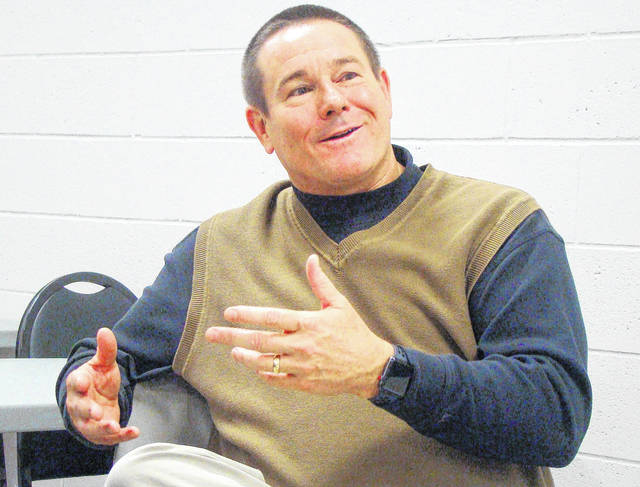ELIZABETHTOWN — County representatives met with leaders from law enforcement, the faith community and others Wednesday morning to discuss an available grant that could be used to help combat the county’s growing opioid abuse, but the window to submit the grant application is closing quickly.
County Manager Greg Martin told the group of about 18 the application deadline is Wednesday, Jan. 10.
“We’re under the gun with this (because) we just received the information …” he said. “The reason for this meeting is to explore the legalities, process and interest in moving forward.”
The grant, which came to the county through a request for interest by Eastpointe, a managed care organization that services Bladen County and 10 others in the region. The grant would total $50,000 and would have to be used for one of three areas: a jail diversion to treatment program, a follow-up after Narcan administration, or for coalition building.
Bladen County has chosen to focus on the jail diversion to treatment effort.
“We have so many incarcerated with drug issues, and their time would be better served in treatment,” Martin added. That treatment, with funding from the grant, would be provided by Southeastern Carolina Crossroads.
But one of the concerns raided Wednesday was that those arrested and charged with drug offenses might opt for the treatment and then decide to leave the Crossroads facility.
“We are a faith-based facility — we’re not a detox facility or a locked facility,” said Interim Executive Director Kincy Barrow. “We can’t hold anyone against their will if they don’t want to stay.
“My only concern is, what is their motivator (to stay,” he added. “If the only reason they are coming (to Crossroads) is to stay out of jail, it’s not going to be successful.”
Bladen County Resident Superior Court Judge Douglas Sasser, however, said there are several options the court can use to deal with that concern — such as a deferred prosecution or treatment that is part of a plea arrangement. Should an individual choose not to complete the treatment program — which lasts 42 days at Crossroads and has a 30-day follow-up built in — then the individual would be brought back to court.
“Most of these people aren’t bad people,” Sasser said. “But they need help and can’t afford it.
“That said, (attending Crossroads) has to be option, it can’t be ‘this where you are going to go,’ but it can be one of the options,” he added.
Quentin McGee, an assistant district attorney in Bladen County, spoke about the process of arrests during a roadside traffic stop or immediately following other arrests where drugs are involved.
“I think it would be beneficial to offer treatment to an individual on bond as a condition of their release,” he said. “That way there is some motivation to take it seriously and complete the program.”
Barrow told the group it costs $1,900 per person to go through the program at Crossroads. Each individual in the program is asked to pay a $500 fee, but Barrow said “if they can’t pay any or all, we don’t turn them away.”
Another concern, brought up by Richard Allen with the Bladen County Sheriff’s Office, was where treatment would be available for women.
Elizabeth Woodburn, a grant writer with the Columbus County Sheriff’s Office who will be writing the grant application for Bladen County, said the program could be started for men at Crossroads, which currently is open to men only, and then expand down the road.
County Commissioner Charles Ray Peterson, who heads the county’s Opioid Task Force, said he’d had contact with the Albemarle Teen Challenge, which works with women, and representatives will be attending the next task force meeting on Tuesday.
Barrow also offered information about Crossroads hoping to expand to include a women’s treatment program down the road. He said Crossroads currently has 10 open beds, but that can easily change from day to day. he also said the board is hoping to refurbish another building on the property that could accommodate up to 18 additional beds.
Allen added that a Celebrate Recovery program is being offered to inmates and could be a good stepping stone for those looking for additional treatment. He also said it would give the county a good idea what inmates are serious about getting clean.
“If we are using the grant money for counseling, we need to know they are serious about things,” said Allen.
The group gave a thumbs up to move forward with the grant application process. Woodburn asked that the Sheriff’s Office, District Attorney’s Office, Sasser and Crossroads get information to her by the end of the week about possible programs and procedures so that she can begin writing the grant this weekend.
“This grant would be huge for Bladen County,” said Peterson. “We need to keep showing the community we are serious about this opioid effort.”
***
A second grant
***
The group also heard about another grant available that could offer up to $400,000 in funding across five years to establish a county drug court.
But there were several concerns about a drug court, not the least of which was the fact that the local judges are often assigned to other counties, which could upset the consistency of the drug court.
In addition, funding beyond the initial five years is never guaranteed, and the state is often unwilling to fund them.
The group decided to see how the first grant goes before exploring the drug court option further.
W. Curt Vincent can be reached at 910-862-4163 or cvincent@bladenjournal.com.




